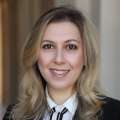As a doctoral student in clinical psychology, , knew right away that something special was happening at the , where she completed her practicum during graduate school.
“I fell in love with the work, with the way it gave me meaning and purpose,” says Dr. Ogaryan. “And I think for the first time, I realized the diversity in clinical care as a budding psychologist at the time, so I became very, very excited.”
So excited, in fact, that she returned to the Simms/Mann Center — which provides no-cost counseling and other psychosocial support services for people receiving cancer care at UCLA Health — for a post-doctoral fellowship. She then joined the staff as a psychologist.
Now, Dr. Ogaryan serves as the center’s training director, shepherding the next generation of social workers, psychologists and chaplains through the deeply personal work of providing whole-person care.
“I’m particularly interested in training our future psychosocial care clinicians to do this work,” Dr. Ogaryan says. “I am particularly invested in creating a legacy that will have a ripple effect for years and decades to come. And I’m also very interested in whole-person care, and part of that includes the cultural humility that comes with providing whole-person care.”
What is whole-person care?
The idea of caring for the whole person is at the heart of the services Simms/Mann Center provides.
“A cancer diagnosis truly impacts someone’s mind, body, spirit, soul — it's not just the physical aspect. It really significantly affects the whole person,” Dr. Ogaryan says. “We want to be able to support them in this process so it doesn’t feel so isolating, so it doesn’t feel so alienating. We’re here to provide integrative approaches to their care as complementing their medical care.”
Whole-person care might include meeting with a dietician to discuss nutrition or talking with a chaplain to address spiritual needs. It could look like one-on-one counseling, participating in a support group or attending a workshop about sleep, finances or . It also means being able to see someone in your own community who speaks your language.
Simms/Mann clinicians provide services at 20 UCLA cancer clinics that stretch from Laguna Hills to San Luis Obispo. Many providers are bilingual.
“Cultural humility is really, really important when we offer our services to people who may come from backgrounds where whole-person care or psychosocial care just aren’t common approaches — especially for our communities where English may not be their first language,” Dr. Ogaryan says. “If English is not their first language, if there’s cultural stigma on something like mental health and there’s an immediate association of psychosocial and mental health, we can envision how that might prevent them from accessing care.”
Dr. Ogaryan offers counseling in English and Armenian. Other languages spoken by Simms/Mann clinicians include Spanish, Vietnamese and Japanese.
A flexible, integrated approach
What makes the Simms/Mann Center’s approach so special is its support services are integrated into a patient’s overall medical care.
“The patient does not have to go out to get this care,” Dr. Ogaryan says. “We are already embedded within their medical team.”
Unlike more traditional therapeutic models, where a patient may meet with a counselor weekly for help with a specific mental health issue, psychosocial services at Simms/Mann are flexible and dynamic. Some people may opt for one-on-one sessions with a clinician, while others might choose to attend a group program or workshop. Patients can mix and match services to meet their evolving needs, Dr. Ogaryan says.
During an initial assessment, Dr. Ogaryan or another clinician spends time learning about the patient’s life. What factors led up to the cancer diagnosis? What kind of support system do they have? What is their life like outside of cancer?
“In those initial assessments, we’re able to determine what might be most helpful for you that doesn’t feel overwhelming or another added appointment on your schedule, but really supportive,” Dr. Ogaryan says. “So it’s a very collaborative process with the patient. We decide together as a team.”
The nature of the work and the support the Simms/Mann center provides revolves around “huge existential themes,” she says: “Life, living, meaning, death, dying.”
“I really am there to feel connected to someone at a time in their life where maybe even the things that they used to do that help them cope is now no longer an option,” Dr. Ogaryan says. “It’s something that I feel just gives me personally a lot of purpose, as a clinician, as a mentor. It gives me a sense of feeling, ‘Wow, I've been given permission to witness someone's experience.’ I think it's such an honor and privilege to do this work.”





